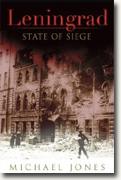Leningrad
Michael Jones
book reviews:
· general fiction
· chick lit/romance
· sci-fi/fantasy
· graphic novels
· nonfiction
· audio books
· author interviews
· children's books @
curledupkids.com
· DVD reviews @
curledupdvd.com
newsletter
win books
buy online
links
home
for authors
& publishers
for reviewers

 |
Leningrad: State of Siege Michael Jones Basic Books Hardcover 352 pages August 2008 |
|
The horrors of war have been well-documented. For some reason, war can cause the basest human instincts to raise their ugly heads and show just atrocities we are capable of. But war also can bring out the inherent goodness in people, the day-to-day heroism of just getting by in the most stressful times imaginable. Out of the darkness sometimes comes the brightest light. Michael Jonesí new book, Leningrad: State of Siege
Jones begins with the story of Operation Barbarossa, the German invasion of the Soviet Union, and how it affected Leningrad. He details the military maneuvering as Army Group North forced its way through the Soviet lines, Leningrad its target. He shows how the Soviet army was in disarray, falling back in panic. Most chillingly, he uses German documents, or collections thereof, to show how Hitler decided that Leningrad would not be taken but instead besieged - how the German army could not afford to feed all the civilians and refugees that would surely inhabit a conquered city the size of Leningrad, and thus that it should be starved to total destruction. Civilians were ordered shot on sight if they tried to approach German lines, and German artillery was used to make sure that German troops didn't falter by having to shoot too many face to face. Jones effectively details not only the German military maneuvers but also the ineptitude of the Soviet defense. The military purges of 1937-38 left few competent commanders, with the defender of Leningrad chosen more for his loyalty to Stalin than for his military leadership. Even the great general Zhukov is shown in a bad light as directly causing the deaths of thousands of Soviet soldiers by maintaining and futilely ordering attacks from an untenable position on the other side of the Neva river. From Jones' descriptions throughout the book, it's no wonder the "real" story of Leningrad didn't come out until the Soviet Union was falling. City fat cats remained behind barbed wire walls, keeping themselves well fed while thousands died each day in the city around them. This sort of thing doesn't lend itself to public satisfaction with its leaders. The shining light of Leningrad: State of Siege Jones clearly shows readers both the depravity and the heroism of these people. Most often, he alternates between good and bad so as not to make the horrors too oppressive. Every time he brings up how some residents of the city had to resort to cannibalism to stay alive, he balances it with an anecdote about somebody who successfully resisted becoming one of these hardened souls, living through the sheer determination to survive what the Germans were doing to them. Even so, the brutal winter is a constant companion - no electricity, no heat, and dwindling supplies of firewood. The book is told almost totally through illustrative anecdotes from various diaries or people who Jones interviewed, showing what was happening in the city and bringing the story to life a lot more than a dry historical recitation would. These anecdotes make the story more immediate, immersing the reader in the horrors of what was going on. Jones pulls himself away occasionally, especially whenever he talks about the bigger picture around Leningrad. Leningrad: State of Siege Leningrad: State of Siege Originally published on Curled Up With A Good Book at www.curledup.com. © Dave Roy, 2008 |
|
|
|
 Click here to learn more about this month's sponsor! |
|
| fiction · sf/f · comic books · nonfiction · audio newsletter · free book contest · buy books online review index · links · · authors & publishers reviewers |
|
| site by ELBO Computing Resources, Inc. | |
 While I certainly can't say that this story has never been told, it's never really been part of the popular history of the World War II. That the siege happened is, of course, common knowledge to anybody who has studied the war to any degree, especially the Eastern Front. But the details told so vividly by the personal accounts Jones uses aren't that widespread.
While I certainly can't say that this story has never been told, it's never really been part of the popular history of the World War II. That the siege happened is, of course, common knowledge to anybody who has studied the war to any degree, especially the Eastern Front. But the details told so vividly by the personal accounts Jones uses aren't that widespread.